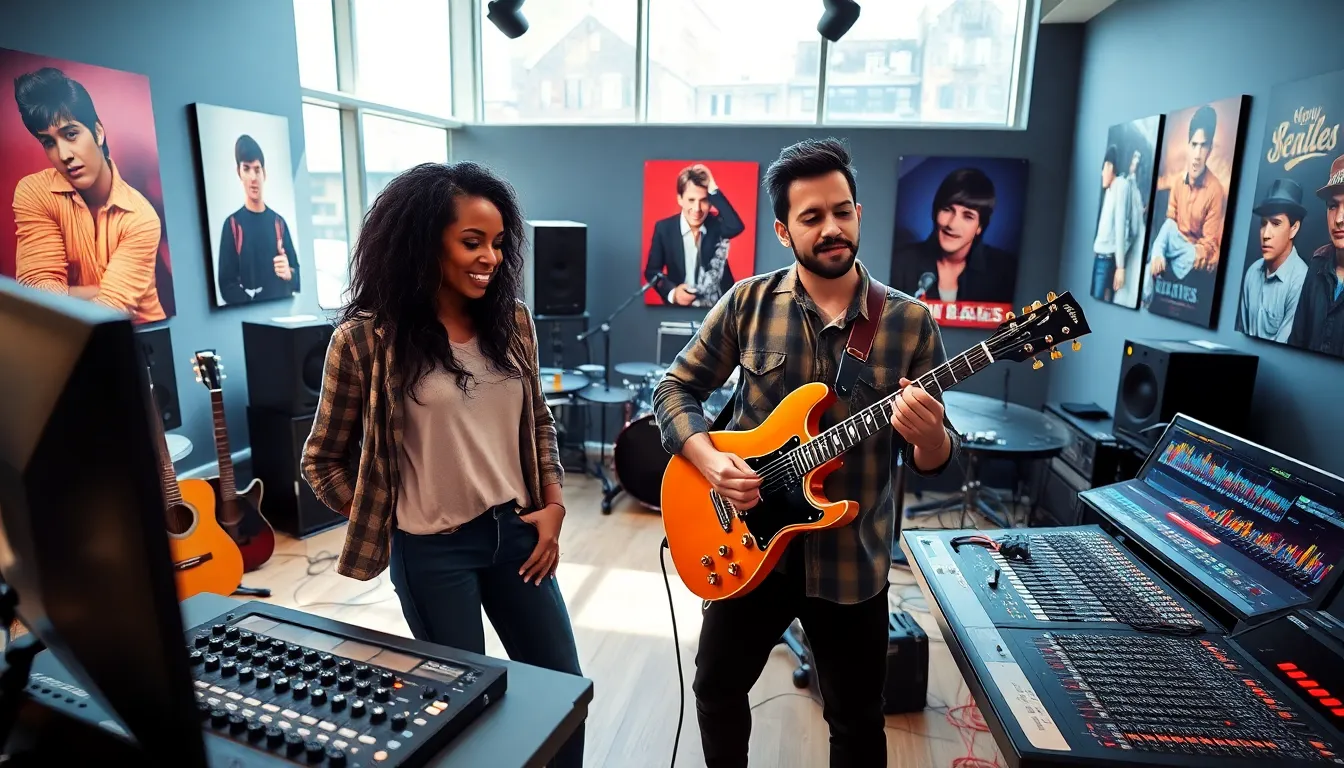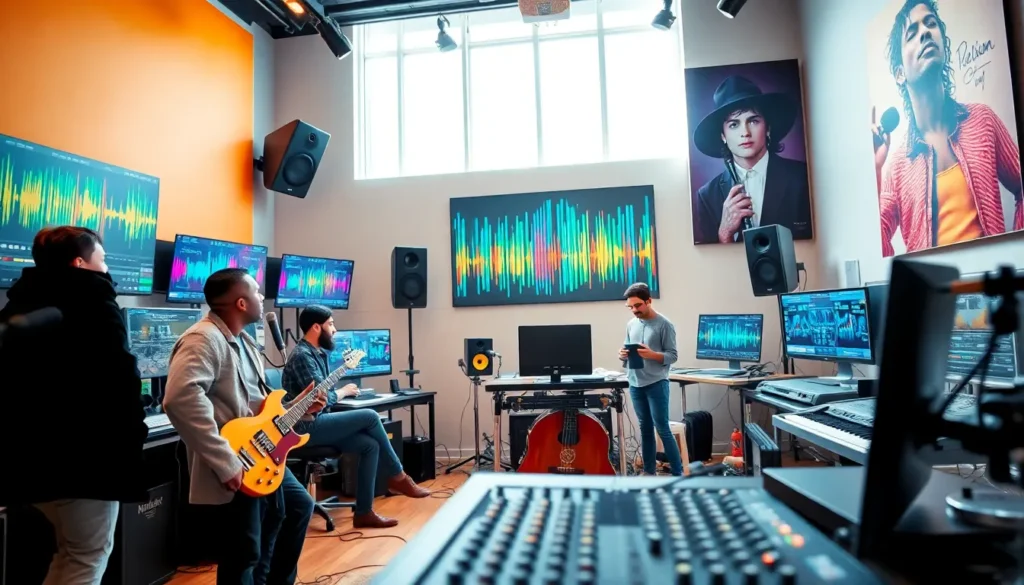Pop culture music is like that quirky friend who seems to know everyone and everything. It evolves at the speed of light, shaping and reflecting society’s moods, dreams, and sometimes its meltdowns. Ever wondered how an infectious melody from a backyard barbecue can grow into a worldwide hit? Or how lyrics can spark movements? Strap in for a journey through the highs and lows of pop culture music, as we explore its birth, its key players, and what the future might hold. Whether you’re a casual listener or a pop music aficionado, there’s something in this exploration for everyone.
Table of Contents
ToggleThe Birth of Pop Culture Music

The roots of pop culture music can be traced back to the various genres that emerged in the late 19th and early 20th centuries. The convergence of jazz, blues, and folk music created a fertile ground for new sounds and storytelling. Jazz brought improvisation to the forefront, while blues introduced raw emotional expression. These genres not only entertained but also provided a voice to marginalized communities, setting the stage for what would become a cultural phenomenon.
As the 1950s rolled in, rock and roll emerged, marking a significant turning point. With icons like Elvis Presley and Chuck Berry, music began to infiltrate mainstream culture like never before. It wasn’t just about the tunes anymore: it was about the lifestyle that came with them. This was music that resonated with the youth, challenging social norms and igniting a cultural revolution.
The mix of these elements birthed pop music as we know it today, catchy hooks, relatable lyrics, and an undeniable danceability. By the 1960s and 70s, with the Beatles leading the charge, pop music not only dominated the charts but also influenced fashion, social movements, and even politics. The era led to a new understanding of music as a powerful vehicle for change.
Influential Genres That Shaped Pop Culture
Pop culture music is a tapestry woven from various influential genres, each contributing unique threads. Rock, of course, played a massive role, bringing forward a sense of rebellion and excitement. Psychedelic rock further pushed boundaries, inviting listeners to explore their consciousness through sound.
Disco took to the dance floors in the 1970s, transforming nightlife and community spaces. As Saturday Night Fever blared through speakers, the glitz and glamour of disco became synonymous with freedom of expression. Fast forward to the 1990s, and hip-hop erupted onto the scene, merging rhythm with poetry and challenging societal narratives. The genre didn’t just entertain: it educated and sparked global conversations around race, class, and identity.
The arrival of electronic dance music (EDM) in the 2000s added yet another dimension. The genre appealed to a new generation, fostering a culture of massive festivals that blurred the lines between performer and audience. These shifting sounds all contributed to the evolution of pop culture music, ensuring it remains an ever-changing phenomenon.
Iconic Artists and Their Impact
No discussion of pop culture music is complete without mentioning the artists who have shaped it. Think of legends like Madonna, whose ability to reinvent herself has influenced countless generations. With her bold steps and provocative lyrics, she challenged the norms of femininity and sexuality, creating pathways for artists to express their identities openly.
Michael Jackson, known as the King of Pop, transcended music with his iconic dance moves and unprecedented video production. The influence of his work is still seen today, as artists strive to blend storytelling with visual artistry.
Then there’s Beyoncé, a titan in the industry whose songs resonate with empowerment and resilience. Her ability to address social issues while maintaining commercial success showcases how artists can use their platforms for activism. Each of these figures has pushed the envelope, proving that music goes far beyond mere entertainment: it can inspire change and unify individuals across divides.
The Role of Technology in Music Consumption
Technology has radically transformed how pop culture music is created, distributed, and consumed. From vinyl records to streaming platforms, the evolution is staggering. Gone are the days when traditional radio and physical sales dictated music listening habits.
Today, with platforms like Spotify and Apple Music, listeners have unprecedented access to a vast library of songs at their fingertips. Algorithms have made discovering new music personalized and instantaneous, shaping collective listening experiences. This shift has changed how artists promote their work as well, social media plays an integral role in marketing, with viral challenges often elevating songs to chart-topping status overnight.
Technology has also democratized the music industry, allowing independent artists to rise and gain recognition without traditional gatekeepers. Home recording equipment and distribution platforms mean that a talented individual can now reach global audiences from their bedroom. This evolution continues to break down barriers, offering new voices the chance to be heard.
Music as a Reflective Medium of Society
Pop culture music serves as a mirror reflecting societal changes and sentiments. During the Civil Rights Movement, powerful anthems like “A Change is Gonna Come” resonated deeply, articulating the struggles and hopes of a generation. Artists wield music as a tool for storytelling, allowing them to address issues like inequality, war, and love.
The pop landscape has also adapted to contemporary issues, such as climate change and mental health. Songs today often serve not only as entertainment but as rallying cries, encapsulating the emotions surrounding global issues. Through storytelling, repetitively catchy choruses, and thought-provoking lyrics, music engages listeners, encouraging conversations that might not otherwise occur.
Also, music festivals and large-scale events often become platforms for activism, blending entertainment with urgent calls for change. In this way, pop culture music remains an influential force, reminding society of its capacity for empathy and progress.
The Future of Pop Culture Music
The future of pop culture music is an exciting realm full of possibilities. With the rapid growth of technology, genres are increasingly blurring, leading to hybrid styles that capture diverse influences. Collaborations between artists from different genres are becoming the norm, exciting new sounds that might break through conventional barriers.
Virtual reality concerts and advancements in immersive experiences might change how fans engage with music, transcending traditional concert venues. Imagine stepping into a virtual space where your favorite artists perform as if you were in the front row.
Also, the dialogue surrounding mental health awareness in music isn’t going away anytime soon. Expected trends suggest that artists will continue to tackle personal and societal issues, creating music that not only entertains but informs and heals. The rise of platforms that support indie artists is also likely to encourage more diverse storytelling, ensuring that a broader range of voices is represented.
Eventually, the evolution of pop culture music will remain intertwined with technological innovations and societal changes, an ever-advancing reflection of the world around us.

